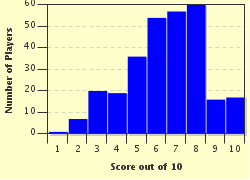Quiz Answer Key and Fun Facts
1. What is the source of the saying "a whole new ball of wax", an expression meant to imply a completely changed situation?
2. In 1870 during the Franco-Prussian War, Prince Louis Napoleon, to satisfy the wishes of his father Napoleon III, was introduced to battle at Saarbruck. This led to the creation of which expression?
3. George decided to buy his first car and went to a local dealership. He was immediately set upon by a sales associate who asked him several questions, most of which he could not answer because of his lack of experience. In the end, he was overwhelmed with too much information and bought a vehicle that was much more expensive than he ever intended to buy, particularly because it was equipped with items he was never going to use. Which of the following idioms below would be a good description of what George was in this situation?
4. What expression, meaning "to take on a dangerous task or perform a brave action", comes from 1 Samuel in the Old Testament during a speech David gives to King Saul when he is attempting to persuade Saul to allow him to face Goliath?
5. All one has to mention is part of a line of a poem--"the best-laid schemes"--and most listeners know that you mean something like this: "Things don't always go right, no matter how carefully they are planned". However, from what poem does this phrase come?
6. Take advantage of what you have. Don't sacrifice what you have for something you may never have. To have something is better than to presume you'll get more of it or get something superior to what you already have. In other words, "A bird in the hand is worth two in the bush". Which fable of Aesop's is most likely the oldest recording of a version of this cliche?
7. What expression is used to refer to an aristocrat or an aristocratic person?
8. If a colleague of mine had gone so far as to do something unethical, something unacceptable according to the mores of our society, where would I say he had gone?
9. The saying "by the sweat of his brow", which means "through his own hard labor", comes from which source?
10. Which expression, most likely derived from the image of fighting dogs, refers to the topic or focus of a dispute?
Source: Author
alaspooryoric
This quiz was reviewed by FunTrivia editor
looney_tunes before going online.
Any errors found in FunTrivia content are routinely corrected through our feedback system.

